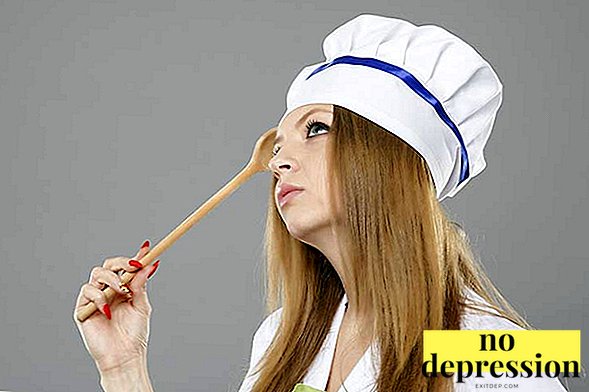People who like to drink, not once faced with depression after alcohol.
It manifests itself in different ways, depending on the amount and strength of the drunk, individual characteristics of the organism and psyche, but always creates additional discomfort for a hangover and can push some people to drink more to soften the condition.
general information

Depression, which are associated with alcohol intake, are not only hangover.
They can be divided into:
- Hungover. Observed in people who drank too much alcohol, occur with a hangover, over time, pass on their own when the body displays the decay products.
- Depression when giving up alcoholic beverages. Occur in people who are addicted to alcohol and are trying to get rid of it. About 20-60% of alcoholics suffer from various types of depressive states that worsen after refusing alcohol because it was for a long time a means of forgetting, temporarily moving away from the symptoms of depression, and they do not know how to cope with it and do not always want to. Also affected by chronic alcohol intoxication.
In the human body there are many types of hormones that affect mood, well-being, cause certain emotional states and regulate a number of important processes in the body.
Human mood depends on the production of the following hormones:
- endorphins;
- dopamine;
- serotonin;
- oxytocin;
- adrenalin;
- norepinephrine;
- vasopressin;
- cortisol

Alcohol can affect the production of some of them, so it is referred to as depressants, that is, substances that cause depression.
The human brain is protected by the hemato-encephalic barrier, so if the body’s poisonous substances fallthey primarily affect other organs and systems, and the brain suffers moderately or does not suffer at all.
But there are a number of narcotic substances that easily seep through this barrier, and this includes ethanol - the main component of any alcoholic drink and other liquids that people can drink. to achieve intoxication (alcohol, pharmaceutical alcohol tinctures, colognes).
When ethanol enters the brain, it starts the production of serotonin - a hormone that affects the appearance of feelings of happiness, relaxation, pleasure.
In parallel, this hormone performs a number of other functions and is also able to influence alcohol addiction formationif it is in the body too much.
This is due to the fact that it increases the activity of another pleasure hormone - dopamine. When the amount of alcohol in the body decreases, the level of serotonin decreases, the mood decreases, so the person wants to drink more.
In addition, ethanol increases the production of norepinephrine. Therefore, when the effect of alcohol decreases, the person feels apathetic and lethargic.
Alcohol cannot help get out of depression and, on the contrary, greatly aggravates the human conditionwho takes it regularly in the hope of feeling better.

Depression is a suitable foundation for the development of all sorts of addictions, including alcohol, and to get out of this depression will take a lot of effort, because it will be necessary to treat not only a mental disorder, but also alcoholism.
Also alcohol can not be used in parallel with antidepressants, because it increases the likelihood of side effects and reduces the effectiveness of the drug.
Alcohol, in principle, cannot be combined with the intake of drugs, as it, together with the drug, creates huge load on the liver.
About the interaction of alcoholism and depression in this video:
Causes of mood decline in refusal to drink
The main causes of the development of depressive states or aggravation of those that existed earlier, in case of refusal from alcoholic beverages:
- Psychological dependence on alcohol. A person who has been consuming alcohol for a long time gets used to using it as a remedy for bad mood, depression, anxiety, and feeling unwell (often provoked by alcohol itself). Therefore, the impossibility of detaching oneself from reality with the help of the already familiar alcohol worsens a person’s mood, and during the period of getting rid of alcohol addiction, an alcoholic can rush to other extremes, find other ways to experience pleasure, for example, start playing games of chance.
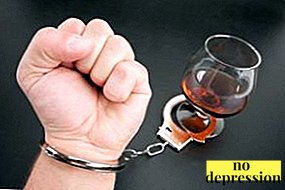 Alcohol withdrawal syndrome. This is the so-called alcoholic breakdown, the main symptoms of which, with proper treatment, go away rather quickly, but residual disorders, such as anxiety, depression, can persist for a long time.
Alcohol withdrawal syndrome. This is the so-called alcoholic breakdown, the main symptoms of which, with proper treatment, go away rather quickly, but residual disorders, such as anxiety, depression, can persist for a long time.- The consequences of alcohol intoxication. When excessive and prolonged use of alcohol adversely affects the brain: disrupts the functioning of individual zones, affects the sensitivity of receptors of a number of hormones, can lead to alcoholic encephalopathy, in which intelligence, memory, attention, sleep are disturbed, and somatic deviations are observed. Over time, some violations may become less pronounced, but in most cases they persist throughout life.
It is also important to take into account that some alcoholics begin to drink because of the presence of primary depression.
It is she who becomes the trigger, which starts dependency, and when a person refuses alcohol, depressive symptoms, which are partially drowned out by regular drinking, come to the fore.
Therefore, it is important to start treatment for concomitant depression as quickly as possible, otherwise the person is unlikely to be able to get rid of alcoholism.
Why a bad mood the day after taking alcohol? Psychologist about alcohol depression:
Why there is a hungover blues?
The main cause of depressive symptoms of a hangover is a drop in the level of norepinephrine and serotonin in the body. But there are factors that increase the likelihood of depression, and among them:
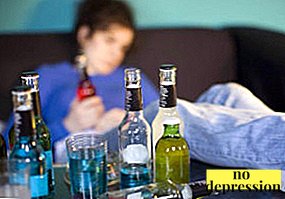 Amount, strength drunk and length of binge. The longer a person drinks, the more severe the consequences will be. Also, a classic hangover can transform into an abstinence syndrome if a person develops an alcohol dependence.
Amount, strength drunk and length of binge. The longer a person drinks, the more severe the consequences will be. Also, a classic hangover can transform into an abstinence syndrome if a person develops an alcohol dependence.- Individual features of the body. People with various metabolic disturbances, diseases of the kidneys, liver, stomach, are more likely to suffer from various consequences of a hangover, including post-alcohol depression. Also important is the presence of abnormalities in the nervous system and brain.
- The presence of mental illness. Mental illnesses exacerbate the mental state and increase the likelihood of developing alcoholism. When a person is not all right in life and in the head, alcohol becomes a means that helps to withdraw from the troubles. But when his action ends, the problems do not go away, so the person feels depressed and helpless.
AT risk group are:
- women;
- people who have primary depression or other mental disorders.
A hangover depression goes away with time, but its duration depends on many factors, including mental and physical health, gender, amount and strength drunk, weight, age, duration of alcohol consumption.
In most cases, the symptoms are significantly reduced after the decay products of alcohol disappear from the body, that is, within a few days.
In some cases, the symptoms persist. several weeks or months.
Alcoholism as a manifestation of depression. About the opportunity to help deal with this problem in this video:
Symptoms and signs
The main symptoms of alcohol depression similar to the symptoms of classic depression. Observed:
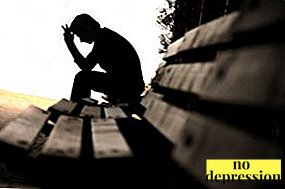 mood deterioration (moderate to severe);
mood deterioration (moderate to severe);- general depression;
- sleep disturbances (difficulty falling asleep, superficial sleep, drowsiness, frequent waking);
- apathy, lethargy;
- no desire to do anything;
- self-loathing (especially strong in cases where a person has primary depression);
- anxiety, panic attacks;
- difficulty concentrating;
- the feeling that everything is meaningless;
- suicidal feelings (not in all cases);
- guilt;
- a sense of worthlessness;
- appetite disturbances;
- irritability.
Effects
How long the spleen lasts and what can lead?
Despite the fact that the hangover depression does not last long, you should not underestimate its danger, especially if a person has a mental disorder in history.
It can lead to:
- Autoagression, that is, aggression directed at oneself. A person scratches, cuts himself, bites to blood, leaves burns. The features of autoaggression manifestation depend on many factors, and in most cases, autoagression is not in itself a sign of suicidal feelings: usually people who do this do not seek to commit suicide. They can do this, for example, from the desire to punish themselves. At the same time, auto-aggressive moods are rarely observed in mentally healthy people, who simply overdo it with drinking and do not have alcohol dependence.
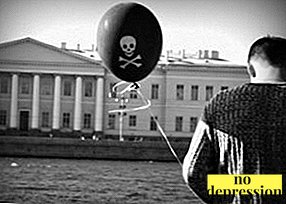 Attempts to commit suicide. Some people end their lives in suicide during the period of hangover. But suicidal tendencies are rarely observed in mentally healthy people, even after alcohol.
Attempts to commit suicide. Some people end their lives in suicide during the period of hangover. But suicidal tendencies are rarely observed in mentally healthy people, even after alcohol.
Also, a hangover depression can be a foundation for development alcohol addiction and real depressionrequiring long-term treatment.
Treatment
What to do: how to get out of alcoholic depression after?
To relieve depression after alcohol, you should:
- Accelerate the elimination of decay products. To do this, drink more pure water.
- Restore hormone levels. To feel better with alcohol depression, you can do sports: during physical activity, the brain produces a number of pleasure hormones. You can also eat some sweets, take a walk in the fresh air, do your favorite thing, watch a comedy film, take a shower.
Special treatment for hangover is usually not required. If you have trouble sleeping, you can drink classic sedatives remedies, such as Valerian tablets.
Alcohol pharmaceutical tinctures should not be drunk during the recovery period.
But if for some reason the depressive symptoms did not disappear a few days after drinking alcohol, need to see a doctor.

With depression, which arose after the abandonment of alcoholic beverages in an alcoholic, the situation is more complicated.
This type of depression is treated with psychotherapy and medication.
- Medicines Appointed by the attending physician, are selected depending on the particular manifestations of depression, and may include antipsychotics (for example, Sulpiride), antidepressants (Tianeptine, Pyrindole), benzondiazepines (Fenazepam), antipsychotics (Tioridazine).
- Psychotherapy. It allows to significantly alleviate depressive symptoms, but is only useful in cases when the patient is really ready to work on overcoming dependence and its consequences. Various psychotherapeutic methods are applied, including cognitive-behavioral psychotherapy, hypnotherapy.
It is difficult to cure the depression burdened by alcoholism, and much depends on the patient’s efforts and desire.
Post-alcohol depression prevention
By far the best prevention of this type of depression - do not drink alcoholic beverages. However, this is not suitable for everyone, and it is incorrect to consider alcohol as an absolute evil: it is capable of benefiting from moderate use, as has been proven by many studies.
How to fight? Preventive recommendations:
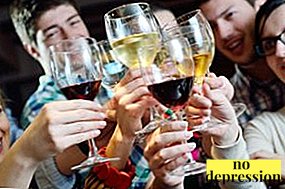 Drink moderately, infrequently and do not reach a state where alcohol significantly affects behavior.
Drink moderately, infrequently and do not reach a state where alcohol significantly affects behavior.- Before drinking alcohol it is important to eat well. If you plan to drink a lot, it is useful to take the sorbent agent (for example, activated carbon) during the drinking process or immediately after. This will reduce the chance of a hangover.
A rational, thoughtful approach to drinking alcohol will avoid most of the problems associated with it.

 Alcohol withdrawal syndrome. This is the so-called alcoholic breakdown, the main symptoms of which, with proper treatment, go away rather quickly, but residual disorders, such as anxiety, depression, can persist for a long time.
Alcohol withdrawal syndrome. This is the so-called alcoholic breakdown, the main symptoms of which, with proper treatment, go away rather quickly, but residual disorders, such as anxiety, depression, can persist for a long time. Amount, strength drunk and length of binge. The longer a person drinks, the more severe the consequences will be. Also, a classic hangover can transform into an abstinence syndrome if a person develops an alcohol dependence.
Amount, strength drunk and length of binge. The longer a person drinks, the more severe the consequences will be. Also, a classic hangover can transform into an abstinence syndrome if a person develops an alcohol dependence. mood deterioration (moderate to severe);
mood deterioration (moderate to severe); Attempts to commit suicide. Some people end their lives in suicide during the period of hangover. But suicidal tendencies are rarely observed in mentally healthy people, even after alcohol.
Attempts to commit suicide. Some people end their lives in suicide during the period of hangover. But suicidal tendencies are rarely observed in mentally healthy people, even after alcohol. Drink moderately, infrequently and do not reach a state where alcohol significantly affects behavior.
Drink moderately, infrequently and do not reach a state where alcohol significantly affects behavior.